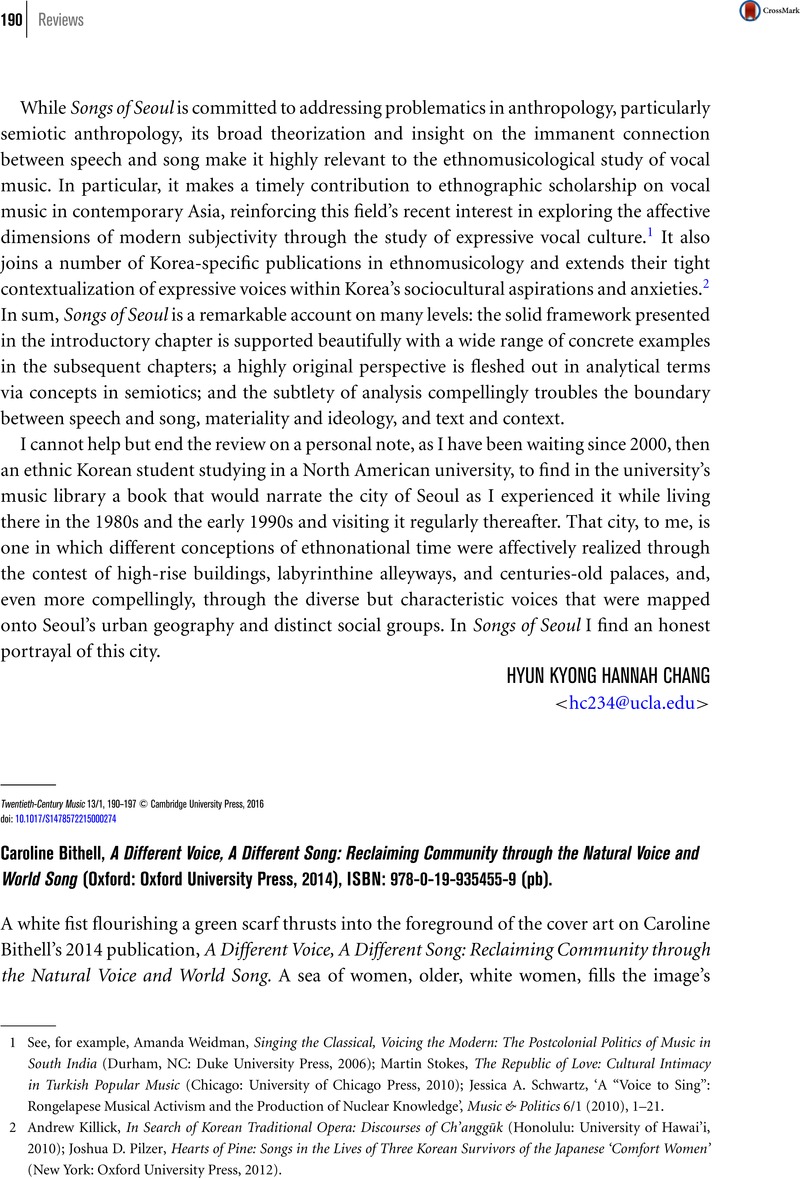No CrossRef data available.
Published online by Cambridge University Press: 14 March 2016

1 Johnson, E. Patrick, Appropriating Blackness: Performance and the Politics of Authenticity (Durham: Duke University Press, 2003)CrossRefGoogle Scholar.
2 Recent voice studies publications include: Sterne, Jonathan, ed., The Sound Studies Reader (New York: Routledge, 2012)Google Scholar; Thomaidis, Konstantinos and McPherson, Ben, eds, Voice Studies: Critical Approaches to Process, Performance, and Experience (New York: Routledge, 2015)Google Scholar; Schlichter, Annette and Eidsheim, Nina, eds, ‘Voice Matters’ Spec. issue Postmodern Culture 24/3 (May 2014)CrossRefGoogle Scholar; Thomaidis, Konstantinos and McPherson, Ben, eds., Journal of Interdisciplinary Voice Studies , 1/1 (2016)CrossRefGoogle Scholar.
3 Ihde, Don, Listening and Voice: Phenomenologies of Sound (Albany: State University of New York Press, 1976)Google Scholar.
4 Feld, Steven, ‘They Repeatedly Lick Their Own Things’, Intimacy Spec. issue Critical Inquiry, 24/2 (1998)CrossRefGoogle Scholar.
5 Connor, Steven, Dumbstruck: A Cultural History of Ventriloquism (Oxford: Oxford University Press, 2000)CrossRefGoogle Scholar.
6 Feld, Steven, Fox, Aaron, Porcello, Thomas, and Samuels, David, ‘Vocal Anthropology: From the Music of Language to the Language of Song’, in A Companion to Linguistic Anthropology, ed. Duranti, Alessandro (Malden: Blackwell Publishing, 2004)Google Scholar.
7 Cavarero, Adriana, For More than One Voice, trans. Paul A. Kottman (Stanford: Stanford University Press, 2005)Google Scholar.
8 Dolar, Mladen, A Voice and Nothing More (Boston: MIT Press, 2006)Google Scholar.
9 A single exception is Bithell's very brief and problematic reference to Roland Barthes' essay, ‘The Grain of the Voice’. See Barthes, Image, Music, Text, trans. Stephen Heath (New York: Hill and Wang, 1977). Bithell draws on Barthes to counter Western assertions that Other voices sound ‘bad’ or ‘unmusical’. What sounds ‘Other’ to Western ears, Bithell claims, are voices that sound out the bodies of marginalized subjects from the Global South: these voices reveal bodies that have ‘lived and suffered and come to know both pain and ecstasy’ (46). The notion that Other voices are inherently more embodied and connected to nature, while Western voices are unmarked and disciplined, reproduces the ideology of romantic racialism, and uses Barthes to recapitulate a readerly conception of essentialized Other voices and bodies. This is regrettable.
10 See Erlmann, Veit, ‘Refiguring the Early Modern Voice’, Qui Parle? 22/1 (2012)Google Scholar and Steven Feld, ‘They Repeatedly Lick Their Own Things’ and ‘Vocal Anthropology’.
11 Nina Eidsheim, ‘Voice as a Technology of Selfhood: Towards an Analysis of Racialized Timbre and Vocal Performance’ (DPhil diss., University of California, San Diego, 2008), 50–3.
12 Marshall, Caitlin, ‘Crippled Speech’, Voice Matters Spec. Issue Postmodern Culture , 24/3 (2014)CrossRefGoogle Scholar.
13 Schlichter, Annette, ‘Un/Voicing the Self: Vocal Pedagogy and the Discourse-Practices of Subjectivation’, Voice Matters Spec. Issue Postmodern Culture , 24/3 (2014)CrossRefGoogle Scholar, np. https://muse.jhu.edu/journals/postmodern_culture/v024/24.3.schlichter.html (accessed 9 November 2015).
14 Sandahl, Carrie, ‘The Tyranny of Neutral: Disability & Actor Training’, Bodies in Commotion: Disability & Performance , ed. Sandahl, Carrie and Auslander, Philip (Ann Arbor: University of Michigan Press, 2005)CrossRefGoogle Scholar.
15 Gustavus Stadler, ‘On Whiteness and Sound Studies’, SoundingOut! The Sound Studies Blog. 6 July 2015.
16 Novak, David and Sakakeeny, Matt, eds, Keywords in Sound (Durham: Duke University Press, 2015)CrossRefGoogle Scholar.